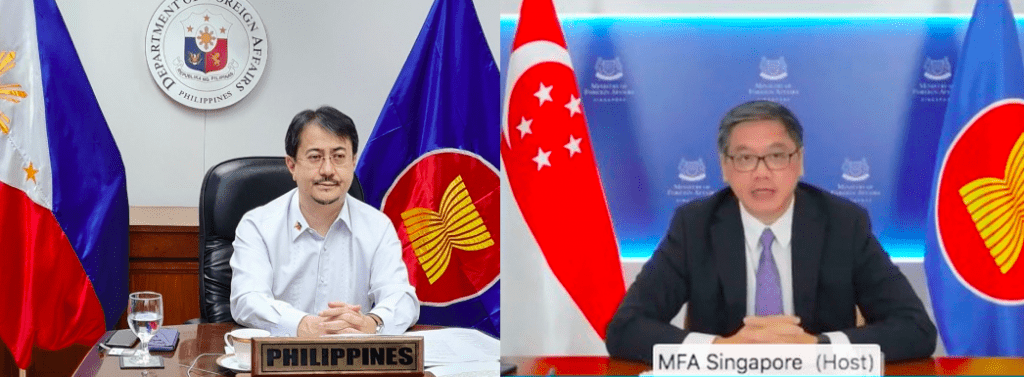News
PH, Singapore agree to tighten defense, economic, health ties

MANILA – The Philippines and Singapore agreed to bolster ties in the areas of defense, trade and investment, labor, and health, specifically on pandemic response as the region continue to battle the coronavirus disease 2019 (Covid-19) worsened by the emergence of the more infectious Delta variant.
In a July 16 statement posted on its website, the Department of Foreign Affairs (DFA) said the two neighbors had productive discussions on the overall development of their bilateral relations during the virtual 5th Informal Consultations on the Philippines-Singapore Action Plan (ICPSAP) on Wednesday.
“Both sides had productive discussions on the developments in Philippines-Singapore bilateral relations, updates on joint cooperation initiatives, and prospective ways to further advance the engagement and collaboration of the two countries,” the DFA said.
Trade and investment relations remain robust between the two countries despite the pandemic, with two-way trade amounting to USD9 billion in 2020 and Singapore becoming the Philippines’ top investor in 2019.
This said both sides agreed to explore various initiatives to further enhance these economic ties and to hasten post-pandemic recovery.
According to DFA, one key project discussed was the facilitation of the entry of Philippine agricultural products such as eggs, poultry, and vegetables to Singapore, which in turn, will aid Singapore’s bid to diversify its food import sources.
The Philippines also invited Singapore to invest in the development of green and smart cities, particularly in New Clark City; industrial parks and economic zones; clean and renewable energy sources; and waste and water management systems.
Acknowledging the global changes with the advent of Industry 4.0 and increasingly digital economies, the Philippines and Singapore likewise agreed to leverage each other’s strengths to promote innovation, support startups and MSMEs, enhance creative industries, improve ICT infrastructure, and cooperate in cybersecurity and data protection.
Singapore, meanwhile, recognized the contribution of the more than 200,000 Filipinos to its socio-economic development and highlighted the key role of Filipino healthcare workers in its pandemic response.
The Philippines, in turn, floated its proposal for a bilateral labor agreement to further protect and ensure the welfare of Filipino workers in Singapore.
On the health aspect, the two nations sought to combine efforts in combatting the coronavirus by sustaining close cooperation between Philippine and Singaporean health ministries.
The two sides agreed to share expertise in contact tracing and treatment strategies, including starting the discussions on the recognition of health certificates for inbound travelers in anticipation of the resumption of travel after the pandemic.
Among others, both sides discussed ways to intensify engagements in the areas of maritime domain awareness, counterterrorism, defense industry development, intelligence exchange, joint military training, and law enforcement.
“Both sides also tackled pressing regional issues of mutual concern, and committed to closely coordinate and work together to respond to the same,” the DFA said.
The meeting was co-chaired by Foreign Affairs Assistant Secretary for Asian and Pacific Affairs Neal Imperial and Singaporean Foreign Ministry Deputy Secretary Ng Teck Hean.
Held annually at the assistant secretary-level, the ICPSAP is the primary bilateral mechanism by which the Philippines and Singapore review the implementation of its action plan.
The said action plan is a consolidated framework identifying priority areas where the two nations could collaborate bilaterally and multilaterally.
The ICPSAP was last held in Manila in December 2018, with Manila set to host the next meeting in 2022.





















